- Home
- Gavin Chappell
The Hadrian Legacy Page 8
The Hadrian Legacy Read online
Page 8
‘What’s that?’ he asked in alarm as the woman put the bucket down and plunged a cloth into it.
‘Lime water,’ said Drustica. ‘For your hair.’
‘For my hair?’ Flaminius repeated.
Before he could add anything else, the woman slapped the lime water onto his hair and started massaging it in. He normally washed it with lye soap, and lime water would ruin it. He’d not be able to hold his head up high in Baiae society again. Assuming he ever got back to Baiae.
One of the men came forward, bringing with him a pot containing something that stank much worse than the lime water. It smelt like manure. He also carried a leather pouch full of small bone needles, and a little hammer.
‘Now what?’ Flaminius asked.
Drustica laughed. ‘For the tattoos,’ she said. ‘Just think, while I’m turning into a proper Roman lady, you’re becoming a barbarian.’
Flaminius stood up, waving the man away. ‘No tattoos,’ he insisted. ‘Do Britons wear tattoos? I thought you just had war paint.’
‘Everyone in Britain has tattoos,’ Drustica said. ‘Apart from foreigners, of course.’ She seemed to have forgotten for the moment that she was a Roman citizen now. ‘They’re what sets us apart from other folk. The painted people, the tattooed nation.’
Flaminius thought they looked rather ugly. ‘Are you tattooed?’ he asked her curiously. He couldn’t see any on her skin.
‘Of course,’ she said with a smile. ‘One of these days, if you’re lucky, you’ll get to see them. Now sit down! Enough of your vanity, Gaius. You’re doing this for Rome, remember.’
‘Not on my face,’ he insisted. ‘Not something I can’t get rid of. Why can’t I just wear war paint? Would it wash off?’
‘Only if you scrubbed with soap,’ she admitted. ‘You could wear it for a long time before it faded, unless you insisted on attending the bathhouse. All the same—you must have a tattoo. Very well!’ she added as Flaminius looked about to argue, ‘not on your face. What about on your chest? A horse, I think. You’re a horseman. You’ll be a devotee of Epona.’
In the end, he accepted a horse tattoo on his chest and war paint on his face.
As the tattooist tapped bone needles into the skin of his chest and rubbed woad into the resulting nicks, Flaminius wondered if the City was truly worth it. He’d made his sacrifices to Rome—why, last year, at the newly rededicated temple of Venus and Rome, he’d offered up a sheep to the Goddess of the City. And that was by no means the only sacrifice he’d made.
Flaminius’ punctured chest was stinging all over. He reached up to rub at it and the man shook his head.
‘Honey,’ he said.
Flaminius was taken aback. ‘Really! We’re barely acquainted.’
‘It’ll help the tattoo heal,’ Drustica informed them. Directing the tattooist to put honey on his wounds as well, she stepped back and regarded him. ‘There. All you need is some suitable clothes; tunic, breeches even, if you want to make them think you come from a highborn family. Then you’ll be the image of a back-hills troublemaker come down to join the foreigners.’
‘And you think they’ll take me on?’ Flaminius said.
Drustica shrugged. ‘I’ve never been a tribune of auxiliary horse,’ she pointed out. ‘The only person round here who would know that question… is you.’
Flaminius shrugged. ‘I learnt not to ask questions,’ he said. ‘All that mattered was that the man could ride and fight.’
‘Aye,’ said Drustica. ‘And I know you can. Very well, as I remember.’
Flaminius shrugged, a little embarrassed. ‘I must be a bit rusty now,’ he said. ‘I’ve been with the Praetorians. Clodhopping spit and polish brigade, them.’ But he was pleased by Drustica’s commendation. A thought struck him. ‘You said you’d be coming…’
‘Aye,’ said Drustica. ‘I know these people’s ways better than you; I’m one of them, for all my Roman citizenship. I’ll be at your side. You can learn from me—and from them. We’ll both join up.’
Flaminius chose his words carefully. ‘One thing I have to say,’ he told her, ‘as tribune… when taking on new recruits… I never took on…’
‘Well?’ she said frostily.
He said in a rush, ‘I never took on any women.’
‘You never asked any questions,’ she said, ‘but you wouldn’t take on a woman?’
He shrugged, hoping he’d not offended her. ‘Never had the opportunity,’ he said.
‘You’d be surprised,’ she told him. ‘Women fight, even for the Romans. But you wouldn’t know.’
‘Eh?’ he said.
‘It’s not that hard to counterfeit masculinity,’ she said primly. ‘I’ve known girls join the auxiliaries, and the officers never guessed.’
‘And the men?’ Flaminius was horrified.
‘Wouldn’t touch them,’ Drustica assured him. ‘Too scared. Men who kill they can understand. Women who kill…’
‘Yes, I quite understand,’ said Flaminius. Drustica met his gaze and he flinched. He remembered how ferociously she had fought at his side in the slave tunnels under Hadrian’s villa.
Early the following morning, he was woken from sleep among the rushes with the other warriors by a friendly boot in the ribs. He saw a fierce helmeted warrior gazing down at him.
‘Your horse is saddled,’ came a booming voice. ‘Get up, chieftain. We’ve got hard riding ahead.’
‘What…?’ Flaminius said feebly. He rose on one elbow. The warrior opened the ear flaps of the helmet to revealing Drustica’s grinning face. She reached out her hand and helped him rise.
As soon as Flaminius was fully dressed in native garb—including trousers! How barbaric! — she led him out into the dewy dawn. Two well-equipped horses stood neighing and snorting in the middle of the courtyard, tended by a servant. Flaminius and Drustica both mounted. A quarter of an hour later they were riding down the Via Agricola in the direction of Coria and the fort of Onnum.
The journey went uneventfully, although they had to make way for several patrols, both riders and infantry. Civilians and provincials were tolerated on the Roman road, but impeding official or military progress was discouraged—often with steel.
—14—
Coria, Hadrian’s Wall, 10 June
They reached Coria in the late evening, rested their horses, and bought food and drink at a grubby eatery in the civilian settlement. The rate of progress frustrated Flaminius, who was accustomed to getting fresh horses at waystations. But if he was to go undercover, he had to forget all the privileges he had previously had as an agent of the Commissary. The conspirators were at all levels of Roman society. He could not draw attention to himself.
That said, he and Drustica had drawn plenty of attention during their journey, especially from the military. Both were the wildest looking barbarians imaginable, clad in bright coloured woollen breeches and tunics, with plaid cloaks fastened by silver brooches at the shoulder. Flaminius wore a bronze torque round his neck. It certainly looked the part, though it chafed. He wore a longsword at his hip and mail under his cloak. Drustica had a spear and shield as well as her helmet.
Flaminius’ head was uncovered, but this only drew attention to his wildly spiked hair—which had after the liming had turned blond overnight, much to his disconcertment. Roman ladies back home who could get them wore blonde wigs, scalped from Germanic maidens for the most part. Maybe when he got back—when, not if—he could introduce lime dyed hair into their lives. In return for certain favours…
‘Out of the way, barbarian!’
Flaminius saw a centurion glowering at him. He was going to bark at the man for his impudence when he realised he was standing in the way of the duckboards leading to the eatery. He was about to step aside when he remembered himself. Scornfully he met the centurion’s eyes, put a hand to his sword hilt and moved threateningly towards the man—then laughed uproariously and ushered him past with an elaborate bow.
Giving this barbarian a glare
the centurion stomped into the eatery, shouting for wine. He brushed past Drustica as she came out with a jug of ale and a loaf of spelt bread. Giving him daggers over her shoulder, she joined Flaminius.
‘Well done, Gaius,’ she said. ‘You play your part very well.’
‘I’ve been studying the role,’ he replied. ‘But please, Drustica—call me Gaesorix.
She nodded. ‘I’d forgotten. And you must call me Drustanos.’
Squatting down in a corner near their resting horses they ate and drank and watched the world pass by. Despite the lateness of the hour Coria was still busy, with travellers, legionaries, and traders, passing in both directions.
After finishing his half of the loaf, Flaminius checked his moneybag. This was something else he’d become unused to; since his status as a Commissary agent gave him the right to requisition food and supplies everywhere (although strict accounts had to be kept).
‘We’ve got enough for a bed for the night,’ he told Drustica. ‘It’s too late to ride up to the fort. Let’s find stables, and bed and board.’ He wondered what sort of lodging two native warriors could expect at this late hour.
The next morning, as he scratched at fleabites on his ankles and peered at the downpour from the door of the hovel where they’d finally found shelter, he told himself that he had had his question answered. The rain hissed down in sheets. What was the matter with this country?
Drustica came to join him. With her helmet under har arm, it was clear that she had cut her naturally fair hair short before spiking it with lime. The only remaining femininity was in her eyes, which softened as they regarded him.
‘Pay the old crone,’ she said. ‘Then we’d better get our horses saddled and ride for Onnum.’
Flaminius woke the old woman who had been their host and handed her a denarius. She snatched it greedily and concealed in the folds of her rags. With uncharacteristic generosity, she handed them slabs of coarse barley bread. Flaminius breakfasted on this as they saddled the horses, and almost broke one of his teeth.
They rode north across the moors. Drizzle marched in serried ranks and Flaminius’ carefully limed coiffure drooped. He began to worry that by the time they got to Onnum he would have lost his barbarous appearance.
—15—
Onnum, Hadrian’s Wall, 11 June
‘You can stay out in the rain and prove your mettle,’ a Gaulish guard shouted from the headquarters building. Flaminius recognised the man as one of the veterans who had been discussing recruitment from local tribes the last time he’d been here.
The rain transformed the exercise yard into a morass. Flaminius and Drustica sat their horses in the middle as a few bedraggled sentries stood watch on the palisade. No doubt patrols were marching up and down the Wall, that stone serpent that wriggled away into the misty distance on either side. Otherwise the troopers seemed to have taken shelter in their barracks blocks.
Riding up the Via Agricola Flaminius and Drustica had practised a routine, horses caracoling, charging, circling, followed by a mock battle with flourished swords and shouts. In the pouring rain, it was difficult to perform well, but after a quarter of an hour he heard a shout from the Gaul to desist.
They ended their mock fight and reined their horses directly facing him. He folded his arms.
‘You’re taken on,’ the Gaul said. ‘Both of you. I’ve got my reservations about you,’ he said, pointing at Flaminius, ‘but you,’ he indicated Drustica, ‘will make a fine decurion, sir. Come inside, both of you, and make your marks.’
Panicked, Flaminius glanced at Drustica. She smiled quietly and shrugged. Flaminius scowled.
They dismounted and led their horses to a waiting auxiliary groom, who led them both out of the rain and into nearby stables. The Gaul who had spoken to them, a thickset, sour faced, red headed man in military uniform, led them inside out of the wet. They came down a passage into an office where he ordered them to make marks on a wax tablet. There was no sign of the prefect.
‘Where’s the commander?’ Flaminius asked.
‘Our new prefect is on his way from Londinium,’ the Gaul said. ‘Right now, the decurion here is the commanding officer. I’m his optio. You, though, will be taken on as a trooper, second class. What’s your name? Gaesorix? How did you get that wound?’
Flaminius glanced down at his bandage, which was spotted with red. ‘Fight in the hills,’ he said.
‘Escaping a blood feud?’ The Gaul softened slightly. ‘You’re alright now. Get down there and introduce yourself to the troop. Decurion Drustanos,’ he added, in a politer tone, ‘let me take you to your quarters.’
And he led Drustica from the office.
Flaminius dithered. Introduce himself to the troop? But where were they? He could hear rain hissing down outside. It didn’t mean going out in that, did it?
A clerk was looking warily at him. What was his problem? Flaminius was about to ask him when he recollected his role. With a snarl, at which the clerk hid his face behind a report, he turned and blundered from the room.
He found the troop in the mess, for the most part, those who were off duty. Entering with much braggadocio, he strode up to the first man he saw, an overweight Gaul with long moustaches, ‘Where can I get a drink, man?’ he said in thick British.
The Gaul studied him distastefully, and in his clearer Gaulish replied, ‘New here, are you?’
‘Aye,’ Flaminius barked. ‘Name’s Gaesorix. You?’ He thrust out a hand to shake the Gaul’s paw.
The Gaul looked down at it, then back up at Flaminius. ‘You a Brit?’
‘Aye.’ Flaminius wondered if he was overdoing his characterisation. ‘Carvettian.’
‘Who are the Carvettians?’ another Gaul sneered. ‘Never heard of them.’ He flexed his knuckles, and spat on the flagstones.
Flaminius wasn’t in the mood to give geography lessons; particularly not with his knuckles, which seemed to be what the man was asking for. Could the troopers be so ignorant they didn’t know the name of one of the native tribes? The locals were Lopocares, as far as he remembered, or maybe it was Corionototae country round here, but he supposed that to these Gauls they were all Brits. He knew that some of the auxiliaries were better educated—the ones he had overheard a few days earlier had heard of the Carvettians.
Another man came up, also a Gaul but less boastful. ‘You the new boy?’ he said. ‘Come with me. We’ll get you kitted up.’
The Gaul, Ambicatus, turned out to be the quartermaster’s clerk. As he led Flaminius down to the stores, eyed his tattoos and his bandage. ‘You a Caledonian?’
Flaminius shook his head. ‘Carvettian,’ he said. ‘Loyal Brit.’
Ambicatus looked a little disappointed. ‘Then you won’t know the Three Virtues.’
‘Three Virtues?’
Flaminius glanced at the man’s forehead. No, no Mithras brand. He wondered how well covered his own was, and if it would look a little strange on a warrior hailing from the back hills of the frontier. What was the man talking about?
‘Worship the gods, do no evil, be a man,’ Ambicatus explained as they entered the stores. Flaminius mulled it over. Nothing wrong with that in principle. Surely something so inoffensive wasn’t what the druids believed. All the same… He wanted to search the quartermaster’s clerk for a serpent’s egg, but doing that would blow his cover wide open.
Flaminius’ Carvettian tribal garb was whisked away and he was given red tunic and breeches, helmet, red woollen scarf, military belt, mail shirt and military boots, longsword, shield and lance, the latter of which were all locked away as soon as they were requisitioned. After a haircut from the troop barber—all that lime gone to waste! —Flaminius followed Ambicatus to the barracks block assigned him. It was ironic. He had gone full circle, from Roman soldier to tribal warrior to Roman soldier again, except this time his tunic was too big for him, and he had been demoted from tribune (late of the Praetorian Guard, dontcha know) to a common auxiliary trooper.
To his dismay
, one of his bunkmates was the Gaul with the long moustaches.
‘Look here!’ Moustaches crowed as Flaminius entered. ‘The back hills barbarians playing warrior!’
Flaminius wasn’t sure how to take this ribbing. He decided to laugh with the Gaul and pound him on the back.
The Gaul leapt back, eyes wild. ‘See that?’ he shouted. Several heads bobbed up from the bunks where their owners had been lounging. ‘Tried to attack me!’
‘Kill him!’ someone shouted. ‘Cut his head off,’ someone else bellowed. ‘We need a mascot.’
Flaminius shoved Moustaches out of the way and went to find a free bunk. If he’d been in command of this troop, he’d have the men who weren’t on patrol duty out training, drilling, anything to keep them busy. They’d been confined to barracks for weeks then set free, but no one was keeping them occupied. Men left to their own devices got bored. And when men like these got bored, someone got hurt.
Just when he realised that there weren’t any free bunks, he got the push he’d been more than half anticipating. Turning on his heel he dealt the Gaul a swift uppercut to the jaw. Moustaches fell backwards and hit the barracks room floor with a thud. Flaminius crouched down to find that he was out cold.
Boxing wasn’t a sport known to the Gauls, but as a boy Flaminius had learnt the rudiments from a slave at his parents’ farm, a former gladiator. He was hardly Olympic Games standard, but he could throw a punch as well as swing a sword.
Looking up, he saw the eyes of all upon him.
‘You’ve killed him,’ said another Gaul, this one clean shaven, but with a long scar running down the right side of his face from brow to chin. ‘You bastard.’
Flaminius shook his head. ‘He’ll live,’ he grunted, and walked over to his bunk. Two of the Gauls jumped him, Scarface and another robust fellow. The latter got in a wild blow at his temple before Flaminius punched him in the throat—he was aiming for the jaw but missed—and head-butted Scarface in the nose.

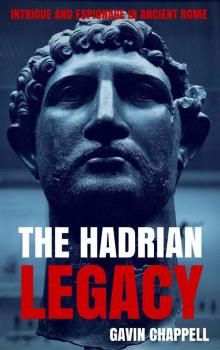 The Hadrian Legacy
The Hadrian Legacy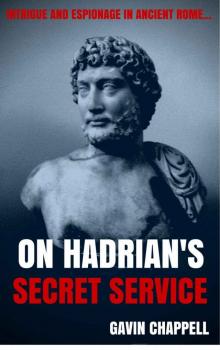 On Hadrian's Secret Service
On Hadrian's Secret Service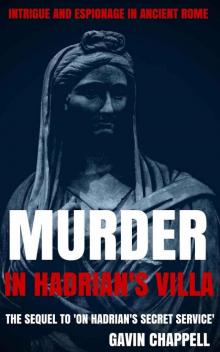 Murder in Hadrian's Villa
Murder in Hadrian's Villa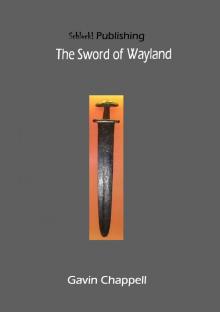 The Sword of Wayland
The Sword of Wayland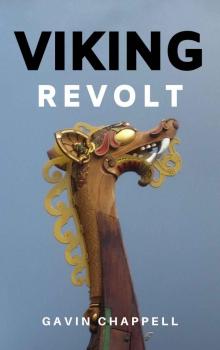 Viking Revolt
Viking Revolt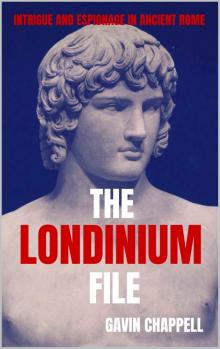 The Londinium File
The Londinium File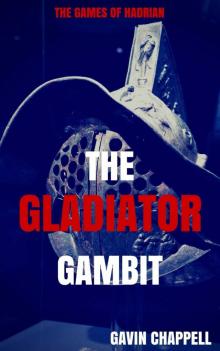 The Gladiator Gambit
The Gladiator Gambit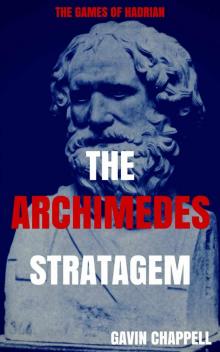 The Archimedes Stratagem
The Archimedes Stratagem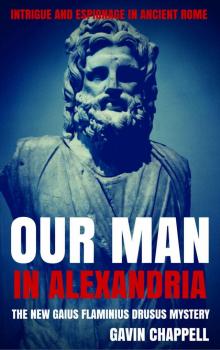 Our Man in Alexandria
Our Man in Alexandria Into the Void (The Dungeoneers)
Into the Void (The Dungeoneers)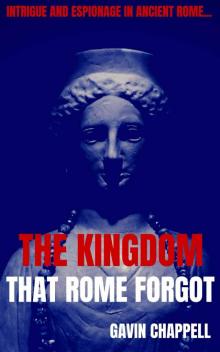 The Kingdom That Rome Forgot
The Kingdom That Rome Forgot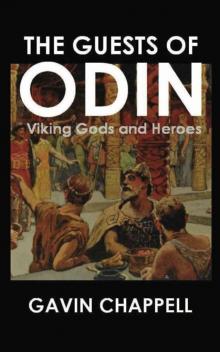 The Guests of Odin
The Guests of Odin